|
|
|
Sort Order |
|
|
|
Items / Page
|
|
|
|
|
|
|
| Srl | Item |
| 1 |
ID:
154714
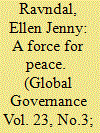

|
|
|
|
|
| Summary/Abstract |
The UN Charter describes him or her merely as the “chief administrative officer of the organization,” yet today the Secretary-General is widely recognized as the UN's chief political representative. How did this transformation and expansion of the office from administrative to political take place? Existing scholarship tends to emphasize the contribution made by Dag Hammarskjöld. This article challenges that story on two accounts: first, by pointing out the importance of institutional factors and not just the officeholder's personality; and second, by examining the contribution made by Trygve Lie, the UN's first Secretary-General. The article establishes a conceptual framework based on institutional theory to understand the role of the Secretary-General and analyzes Lie's contribution in the period 1946–1953.
|
|
|
|
|
|
|
|
|
|
|
|
|
|
|
|
| 2 |
ID:
103463
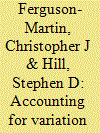

|
|
|
|
|
| Publication |
2011.
|
| Summary/Abstract |
Wind energy deployment varies widely across regions and this variation cannot be explained by differences in natural wind resources alone. Evidence suggests that institutional factors beyond physical wind resources can influence the deployment of wind energy systems. Building on the work of Toke et al. (2008), this study takes a historical institutionalist approach to examine the main factors influencing wind energy deployment across four Canadian provinces Canada: Alberta, Manitoba, Ontario and Nova Scotia. Our case studies suggest that wind energy deployment depends upon a combination of indirect causal factors-landscape values, political and social movements, government electricity policy, provincial electricity market structure and incumbent generation technologies and direct causal factors-grid architecture, ownership patterns, renewable incentive programs, planning and approvals processes and stakeholder support and opposition.
|
|
|
|
|
|
|
|
|
|
|
|
|
|
|
|
| 3 |
ID:
116683
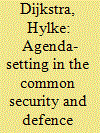

|
|
|
|
|
| Publication |
2012.
|
| Summary/Abstract |
The European Union (EU) has launched an impressive number of crisis management missions since its Common Security and Defence Policy became operational in 2003. This article analyses the agenda-setting phase of these civilian and military operations in order to explain why the EU has sent troops, policemen, judges, prosecutors and monitors across three continents. It presents an institutionalist perspective and argues that the former High Representative Javier Solana and his officials have been instrumental in putting various operations on the agenda. They have employed deliberate agenda-setting strategies, such as venue shopping, conflict expansion and issue framing, to further their bureaucratic interest of launching new missions. Solana and his officials had the ability to affect the agenda-setting process thanks to their pivotal position in policy making. This gave them with superior information on the state of play and an early mover advantage as well as strong international networks. The article provides empirical evidence from the crisis management missions in Aceh, Bosnia, Chad and Kosovo. It concludes with the changes to the Common Security and Defence Policy after the Treaty of Lisbon.
|
|
|
|
|
|
|
|
|
|
|
|
|
|
|
|
| 4 |
ID:
165128
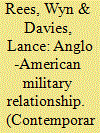

|
|
|
|
|
| Summary/Abstract |
The Anglo-American military relationship is a vital yet neglected area of study. This article argues that the British military have actively cultivated a relationship with the U.S. military that has contributed to the longevity of the broader so-called “Special Relationship,” even in the Trump era. The article contends that the complexities of the military relationship can best be captured by the theoretical lens provided by Lowndes and Roberts that combines different strands of institutionalism to focus on rules, practices, and narratives. The intense linkages between the United States and United Kingdom have become routinized, enabling them to adapt their peacetime cooperation to conflicts, and thereby address post-Cold War security challenges. The article draws upon semi-structured interviews with senior British military officers as well as policy documents to explore how these patterns of collaboration have become ingrained in patterns of both thinking and behavior.
|
|
|
|
|
|
|
|
|
|
|
|
|
|
|
|
| 5 |
ID:
172178
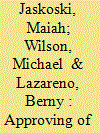

|
|
|
|
|
| Summary/Abstract |
Why do some political radicals—people who believe in using violence for political ends and who may sympathize with local violent groups—not themselves perform violent acts or join violent organizations? This article finds that prior research on terrorism, insurgency, civil war, and ethnic conflict seems to do a poor job of predicting who upon adopting radical political views will actually engage in violence. In fact, there is a great deal of contingency involved in the choice of whether or not to become violent. Employing path dependence, the article treats the radicalizing moment as a “critical juncture,” filled with contingency, but after which actions become more predictable: during this small window of time, radicalized individuals might happen to choose a profession and/or join an organization that is nonviolent, but subsequently become institutionalized as nonviolent actors. The article therefore offers an explanation for how individuals with radical beliefs can be institutionalized as either violent or nonviolent. The study’s findings are based on a content analysis of interviews with 129 nonviolent activists, most of whom exhibited radical beliefs at the time of the interview, and former violent actors, in 12 countries experiencing violent internal conflict.
|
|
|
|
|
|
|
|
|
|
|
|
|
|
|
|
| 6 |
ID:
105863
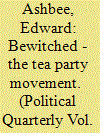

|
|
|
|
|
| Publication |
2011.
|
| Summary/Abstract |
This article considers the development of the Tea Party movement, the character of its thinking and the nature of the interests and constituencies to which it is tied. The article suggests that despite the importance of ideas and interests, and the process of interaction between them, the movement has also been shaped and energised by institutional arrangements. In particular, it argues that there are significant numbers of independent or 'detached' conservatives and that the institutional architecture draws them towards political engagement but at the same time imposes constraints. The political friction that this creates has contributed to the anger that has characterised the movement. While the Tea Party movement may, as such, have only an ephemeral existence, independent conservatives are likely to remain a significant and potent constituency and will, within the institutional structures that define the American political process, give rise to other movements and protests.
|
|
|
|
|
|
|
|
|
|
|
|
|
|
|
|
| 7 |
ID:
175592
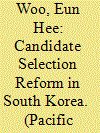

|
|
|
|
|
| Summary/Abstract |
This paper analyzes how democratization has affected the dynamics of candidate selection in South Korea. After democratization in the late 1980s, it was expected that intra-party democracy would follow. In response to increasing public demand, the major parties adopted primary systems in the early 2000s. Nonetheless, most candidates for the legislature are still nominated by a small number of central party elites without additional ballots in the local branches. To explain the persistence of the exclusive, centralized features of candidate selection, I highlight the limited impact democratization has had on the political environment in which parties operate. More specifically, since democratization ended in a compromise among a small number of party leaders, South Korea retained much of the political legacy from authoritarian times, such an electoral system advantageous to the major parties and legal provisions restricting electoral campaigns, party activities, and political participation. The continuation of these political institutions makes radical candidate selection reform highly unlikely as the party elites have no incentive to expand and decentralize the selection process. Without significant changes to the political institutions at the national level, the dominance of the central party elite over the final outcome of candidate selection looks likely to continue for the foreseeable future.
|
|
|
|
|
|
|
|
|
|
|
|
|
|
|
|
| 8 |
ID:
129636
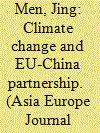

|
|
|
|
|
| Publication |
2014.
|
| Summary/Abstract |
Both the EU and China are important participants in the United Nations Framework Convention on Climate Change and the Kyoto Protocol. The EU's reliance on legally binding rules and institutions demonstrates its strong belief on institutionalism. While interstate cooperation is certainly necessary, implementation of any international agreement and most of the work needs to be done within a state. Henceforth, an uneasy balance between national interests and international responsibility has to be maintained. In the case of EU-China partnership, the carbon aviation tax issue serves as a good example to examine the realist-institutionalist struggle. Although it is still too early to tell if the EU and China would overcome their major disagreements in the field of climate change, there is reason to believe that an international agreement may be reached by 2015.
|
|
|
|
|
|
|
|
|
|
|
|
|
|
|
|
| 9 |
ID:
092909
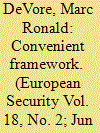

|
|
|
|
|
| Publication |
2009.
|
| Summary/Abstract |
One important discussion about European security focuses on what types of institutions will enable Europe to effectively intervene in regional crises. Thus far, the consensus has been that a European Security and Defense Policy should possess, for its military component, a highly institutionalized and integrative inter-governmental structure. Ironically, Europe's greatest collective foreign military successes were obtained under the organizational auspices of the Western European Union (WEU), whose ill-defined mandate and weak institutional structures contrast markedly from current policy prescriptions. In two campaigns, the WEU coordinated efforts to protect maritime commerce and swept sea lanes for naval mines during the Iran-Iraq War (1987-1988), enforced the United Nations embargo of Iraq during the 1990-1991 Gulf Crisis, and cleared the naval mines left behind after the 1991 Gulf War. The lesson to be drawn from these successful interventions is that Europe profited from a structure capable of limiting the political and diplomatic costs of intervening abroad and not, as is often assumed, an organization designed to maximize military efficiency.
|
|
|
|
|
|
|
|
|
|
|
|
|
|
|
|
| 10 |
ID:
177998


|
|
|
|
|
| Summary/Abstract |
Why did the European Union (EU) launch a naval operation in response to the migration crisis, despite the humanitarian character of the challenge at hand, doubts about the effectiveness of a military response, and the EU’s traditional focus on civilian means? Integrating institutionalist theory and the literature on crisis response, this article argues that EUNAVFOR MED Operation Sophia is an example of copying through contingent learning wherein the EU’s response to the migration crisis was shaped by naval missions Operation Mare Nostrum and Operation Atalanta. While the former set a precedent for a naval response to migration in the Mediterranean, the latter provided an off-the-shelf institutional blueprint for the design and implementation of Operation Sophia. In a crisis situation characterised by high uncertainty, and with little time to rethink policies or to create new structures, EU political actors used contingent learning to quickly evaluate potential policy responses and institutional reforms, leading them to the decision to copy past institutional designs and practices previously considered successful. This finding has relevance beyond the case of Operation Sophia, as it contributes to a better understanding of why a particular type of policy or action is chosen in times of crisis and urgency.
|
|
|
|
|
|
|
|
|
|
|
|
|
|
|
|
| 11 |
ID:
116682
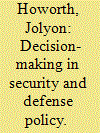

|
|
|
|
|
| Publication |
2012.
|
| Summary/Abstract |
For scholars and practitioners of European politics alike, the distinction between supranationalism and inter-governmentalism has always been fundamental. This distinction has underpinned the various schools of European integration theory, just as it has remained crucial for European governments keen to demonstrate that the Member States remain in charge of key policy areas. Nowhere is this considered to be more central than in the area of foreign and security policy, which has consciously been set within the rigid intergovernmental framework of Pillar Two of the Maastricht Treaty and, under the Lisbon Treaty, remains subject to the unanimity rule. However, scholarship on the major decision-making agencies of the foreign and security policy of the EU suggests that the distinction is not only blurred but increasingly meaningless. This article demonstrates that, in virtually every case, decisions are shaped and even taken by small groups of relatively well-socialized officials in the key committees acting in a mode which is as close to supranational as it is to intergovernmental.
|
|
|
|
|
|
|
|
|
|
|
|
|
|
|
|
| 12 |
ID:
071588
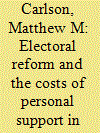

|
|
|
|
|
| Publication |
2006.
|
| Summary/Abstract |
How does the choice of electoral rules affect politicians' incentives to campaign on the basis of personalized support? This article examines to what extent the adoption of new electoral and campaign finance rules affects the incentives of politicians in Japan's Liberal Democratic Party to rely on personal support organizations called koenkai. The core of the analysis utilizes newly collected campaign finance data. The empirical analyses confirm a considerable weakening in the number of koenkai across systems as well as a decreased need for politicians to spend money in the new proportional koenkai representation tier. These results highlight the importance of previous organizational legacies as well as the efforts of political actors to mitigate the effects of rule change on their election and reelection prospects.
|
|
|
|
|
|
|
|
|
|
|
|
|
|
|
|
| 13 |
ID:
108663
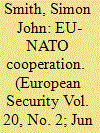

|
|
|
|
|
| Publication |
2011.
|
| Summary/Abstract |
Although EU-NATO institutional relations have been evolving since the Saint-Malo Declaration in 1998, efficient and coherent cooperation is still lacking. This article goes beyond the narrative of blockage caused purely at the political level in order to illustrate both formal and informal EU-NATO cooperation at both the centre (Brussels) and on the ground (missions). This article addresses cooperation in terms of the actors involved at three different levels: state actors, international staff, and military personnel. Although, much has been done to advance cooperation between international staffers in Brussels and between those on the ground in common mission areas, the lack of a political agreement - one that moves beyond the limited scope of Berlin Plus - is causing severe fatigue, most notably at the level of international staff. Furthermore, the informal and ad hoc cooperation that has been the underlying facilitator of synergy between the two organisations could start to atrophy if a grand or intermediary bargain is not achieved in the near future.1
|
|
|
|
|
|
|
|
|
|
|
|
|
|
|
|
| 14 |
ID:
105645
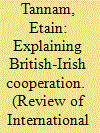

|
|
|
|
|
| Publication |
2011.
|
| Summary/Abstract |
This article applies rational institutionalism, to the case of the British-Irish relationship. Hypotheses are drawn about the role of institutions in advancing cooperation. In section two an overview and analysis of British-Irish agreements and policymaking processes are provided. In section three, the role of institution-building in causing British-Irish cooperation is highlighted. In conclusion, the enduring relevance of rational institutionalism to the British-Irish case is highlighted and its potential to understand conflict in the 21st century is stressed.
|
|
|
|
|
|
|
|
|
|
|
|
|
|
|
|
| 15 |
ID:
088473
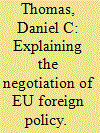

|
|
|
|
|
| Publication |
2009.
|
| Summary/Abstract |
Despite the vast literature on the development of EU foreign policy institutions and the EU's growing experience as an international actor, relatively little effort has been made to explain the often-contentious negotiations among Member States that determine whether or not a common policy is adopted, and if so, what it will be. This paper proposes a Normative Institutionalist theory of intra-EU negotiations on foreign policy and external relations, including hypotheses that explain policy outcomes in terms of entrapment and cooperative bargaining dynamics. It compares these hypotheses' causal mechanisms and observable implications to those of hypotheses derived from Intergovernmentalism as well as theories of Social Learning and Normative Suasion.
|
|
|
|
|
|
|
|
|
|
|
|
|
|
|
|
| 16 |
ID:
152378
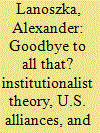

|
|
|
|
|
| Summary/Abstract |
In an important and stimulating article, Stephan Frühling and Andrew O’Neil argue in favor of applying institutionalist theory to understand the alliance politics of U.S. nuclear weapons strategy. But what promise does institutionalist theory really hold in thinking about highly unequal alliances nested in their particular threat environments? I argue that much work remains to be done to determine how much better institutionalist variables explain intra-alliance dynamics over alternative arguments that emphasize power and interests. Balances of power and the nature of threat environments may already account for key aspects of extended deterrent relationships supported by the United States in Europe and Asia. Ironically, the implication of this more traditional interpretation of alliances is that more continuity than change will characterize how Donald Trump will manage U.S. security relationships as President.
|
|
|
|
|
|
|
|
|
|
|
|
|
|
|
|
| 17 |
ID:
148679
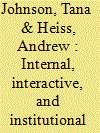

|
|
|
|
|
| Summary/Abstract |
Scholars and practitioners agree that international nongovernmental organizations (INGOs) have become important actors in international relations and policymaking. But an understanding of INGOs’ impact requires a step back, analyzing how and why they behave as they do. We develop a framework that sorts and links relevant factors into three interlocking layers: (1) internal traits of an INGO, (2) interactions between an INGO and other actors, and (3) the overall institutional environment that defines the boundaries of INGO action. To demonstrate the merits of the framework, we review and analyze Internal Affairs by Wendy Wong, The Opening Up of International Organizations by Jonas Tallberg et al., and Borders among Activists by Sarah Stroup. Locating each book within its intended scholarly context, we evaluate contributions to individual layers in our framework. We also examine ties among the books, examining how each work implicitly treats other layers. By uniting internal, interactive, and institutional factors into a holistic framework, we reveal links within existing work on INGOs and illuminate promising avenues for future work about these important actors.
|
|
|
|
|
|
|
|
|
|
|
|
|
|
|
|
| 18 |
ID:
000643
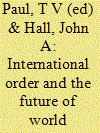

|
|
|
|
|
| Publication |
Cambridge, University press, 1999.
|
| Description |
xx,421p.
|
| Standard Number |
0521551387
|
|
|
|
|
|
|
|
|
|
|
|
Copies: C:1/I:0,R:0,Q:0
Circulation
| Accession# | Call# | Current Location | Status | Policy | Location |
| 042031 | 327.1/PAU 042031 | Main | On Shelf | General | |
|
|
|
|
| 19 |
ID:
071963
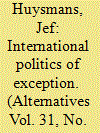

|
|
|
|
|
| Publication |
2006.
|
| Summary/Abstract |
Both political leaders and academics often claim exceptional times. But what does it mean to speak of exceptional politics in international relations? In one sense exceptionality is a descriptive category referring to a radical change in the systemic conditions of international politics. In this article a different notion of exception is examined. It refers to a particular method of conceptualizing the nature of international political order. The exception defines political order by means of constitutional-legal reasoning in which different understandings of the nature and status of international law and its political transgressions describe competing visions of international political order. The focal point of this international politics of exception is not the traditional distinction between liberal and realist views of international politics but the constitutionalist triad of normativism, decisionism, and institutionalism.
|
|
|
|
|
|
|
|
|
|
|
|
|
|
|
|
| 20 |
ID:
096541
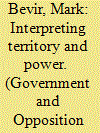

|
|
|
|
|
|
|
|